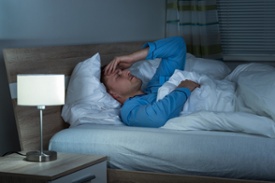When Chronic Pain Is The Enemy Of Sleep.
According to statistics from the 2015 Sleep in America™ Poll conducted by the National Sleep Foundation:
-
Nearly a quarter of those who suffer with chronic pain report higher stress levels
-
Nearly half of those who suffer with chronic pain experience problems at work due to pain-related sleep loss
-
People who suffer with chronic pain lose 42 minutes a night of sleep because of it. That translates into nearly 5 hours weekly, and over 10 days annually. Sleep debt like this can be extremely difficult to overcome
-
A third of those who suffer with chronic pain cannot get enough sleep even when they try to do so for their health and well being
Clearly, pain is the enemy.
What pain does to disturb sleep
Chronic insomnia occurs when someone has long-term trouble falling asleep, staying sleep, or getting enough sleep over the course of the night (for instance, they may wake up too early, or they may never get deep sleep).
For people with chronic pain, the majority will experience insomnia as a result. Aside from the actual discomfort that they experience, they may also lose sleep due to:
- Anxiety about not sleeping
- Naps (to compensate for poor nighttime sleep)
- Night sweats (related to medication use for pain management)

Chronic pain at bedtime creates a stress response in individuals who are trying to relax but can’t because of the constant painful sensations they experience.
Aching, throbbing, stabbing, burning pain may be something they can distract themselves from during the day. However, trying to ignore leg pain at night, or chronic back pain, for instance, is almost impossible and may even be perceived as being even worse if they’re sleep deprived.
When pain awakens them, it’s often because of something called a “micro-arousal,” in which the brain quickly shifts out of deeper stages of sleep in response to changes in the body caused by systemic inflammation.
Lack of sleep due to pain has staggering consequences beyond a bad night’s sleep. These include the development of mood disorders, relationship instability, reduced quality of life, and an inability or indifference to participating in the normal activities of daily living.
Kinds of pain
There are specific kinds of pain that can affect sleep quality:
-
Muscular or joint-related pain in the back, neck, hips, or knees caused by posture problems or injuries
-
Fibromyalgia
-
Arthritis (all forms)
-
Diabetic neuropathy (nerve pain)
-
Migraines and headaches
-
-
Irritable bowel syndrome (IBS) and
ulcerative colitis -
Cancer-related neuropathy (nerve pain)
-
Dental or facial pain
Why lack of sleep amplifies pain

If chronic pain, day and night, isn’t punishment enough, nearly two thirds of those who suffer from it (around 15 percent of the general population and as much as half of the elderly population) suffer from sleep that is disrupted and nonrestorative, according to data published by Spine-Health.
What’s more, disrupted sleep has been shown to exacerbate pain issues.
According to a study published in SLEEP 2012, researchers found that a person’s sleep quality predicted the next day’s pain levels and that those who slept poorly had more pain the day after.
Insomnia may, in fact, trigger inflammatory pathways that exacerbate pain. It may also make your chronic pain more noticeable.
University of Washington professor of psychiatry and behavioral sciences, Michael V. Vitiello PhD, told the Arthritis Foundation in a recent article, “It’s not that the disturbed sleep makes you achy per se, but the disturbed sleep changes your perception of pain.”
How does the person with chronic pain escape this vicious cycle of poor sleep and amplified pain? They can do one or more of the following:
-
Address the source of the pain. Finding and treating the root cause—whether it’s arthritis pain, hip pain while sleeping, chronic neck pain, headache, or fibromyalgia—can provide necessary relief.
-
Practice good sleep hygiene. Mindful bedtime behaviors can do much to improve one’s sleep health. Hip pain at night could be the result of an unsupportive mattress, for instance.
-
Therapeutic approaches. Cognitive behavioral therapy for insomnia (CBT-i)—a strategy that employs relaxation techniques, biofeedback, and behavior modification—is fast becoming the first-line approach to treating pain-related insomnia because it works.
-
Pharmaceuticals. Medications to treat pain, sleep problems, or both can help those who have failed other approaches. Pain and sleep should both be considered when deciding drug strategies.






